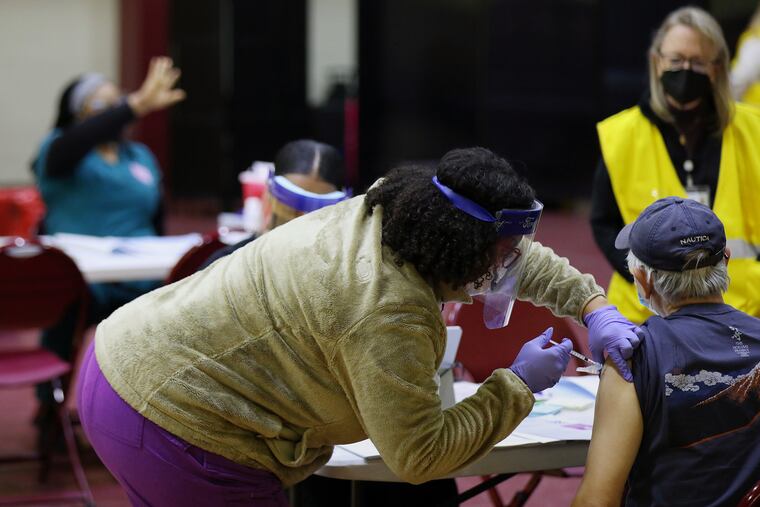Vaccine hesitancy is decreasing, polls show, but many Republicans remain wary
The coronavirus doesn't care about politics, but vaccine rejecters do.

Reluctance to get vaccinated against COVID-19 has been falling sharply among Americans — except for Republicans — but distrust of the medical system remains an obstacle, especially for Black adults, polls during the pandemic show.
Depending on how those survey results are interpreted, the trend bodes well for building herd immunity — or it means too many people are still on the fence about vaccination and need persuading.
“Information they receive in the next few months could determine their decisions,” Harvard University public health researchers conclude in an analysis of 39 national polls conducted between August and February.
Experts theorize that if at least 75% of people in the United States have immunity through infection or inoculation, then the whole population, or herd, will be protected because the virus will not have enough susceptible hosts to keep spreading. How long natural or vaccine immunity lasts is still unclear.
This month, the Kaiser Family Foundation Vaccine Monitor found 57% of U.S. adults have already gotten vaccinated or definitely plan to, while a Civiqs poll found an even higher share — 67% — fall into those categories. Both polls found about a quarter of respondents said unequivocally no to vaccination. The rest were unsure.
But the subset who were unsure fell from 30% in November to 11% last month, according to Civiqs polling.
Axios interpreted the results to mean “the U.S. should be able to reach herd immunity even if the most reluctant people don’t change their minds.”
The researchers at Harvard’s Chan School of Public Health were more cautious in their perspective piece, published Wednesday in the New England Journal of Medicine. Stories about poll results usually lump “definitely” together with the “probably” or “somewhat likely,” creating the impression that most of the public wants to be immunized. But the researchers said evidence from political polling suggests people who are inclined to take an action “do not always do so.”
That caveat makes views by race trickier to compare. The Harvard analysis, led by Gillian K. SteelFisher, found virtually identical overall vaccine acceptance by Black (62%) and white (63%) respondents. But only 31% of Black individuals said they will “definitely” get shots, compared with 46% of white people.
The difference had to do with trust. Among Black respondents, 33% had confidence that vaccines would be properly tested and 36% had confidence that scientists act in the public’s best interests. The comparable figures for white respondents were 43% and 54%.
“For different reasons, though also related to trust, Americans who identify as Republicans are less likely than Democrats to say they will be vaccinated,” the Harvard researchers wrote.
» READ MORE: Where can I get a COVID-19 vaccine in the Philly area? Use our lookup tool.
The Civiqs polling found that in February, 55% of Republicans said they would not get vaccinated or were unsure. That reluctance was the highest of any demographic group, and it wasn’t dramatically less than in December.
Asked before the presidential election about whom they trusted to provide reliable vaccine information, 78% of Republicans had faith in then-President Donald Trump, compared with 7% of Democrats, the Harvard analysis found.
To build trust across the board, the Harvard team urged that family physicians — rather than drug companies, politicians, or even leading medical scientists such as the federal government’s Anthony Fauci — should be “at the fore of education and outreach strategies.”
Since polls show that returning to normal is a motivation for getting vaccinated, outreach strategies should use that to offset warnings about still needing masks and precautions in public. Vaccination is the key to returning to “seeing friends and family or working in an office,” the team said.